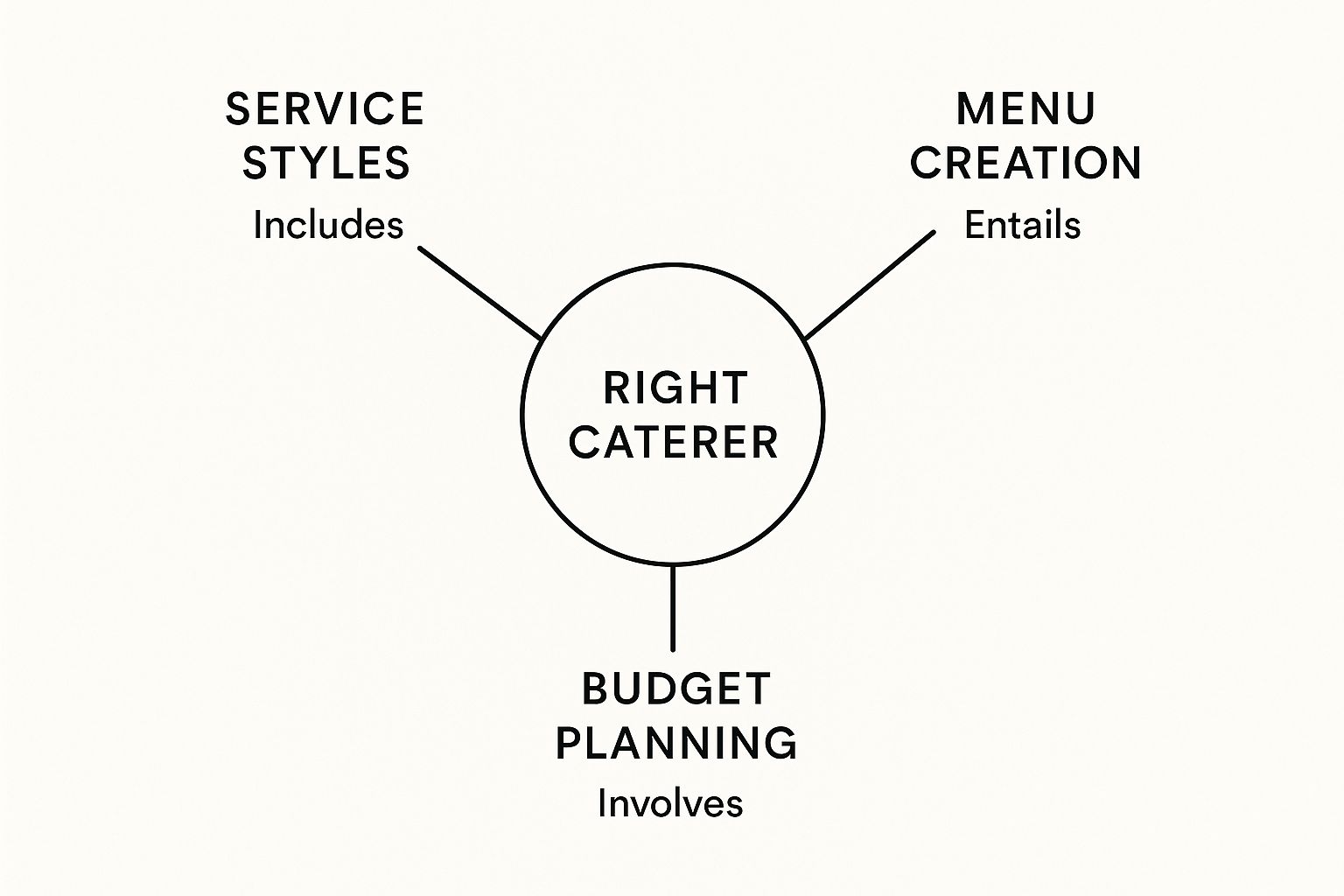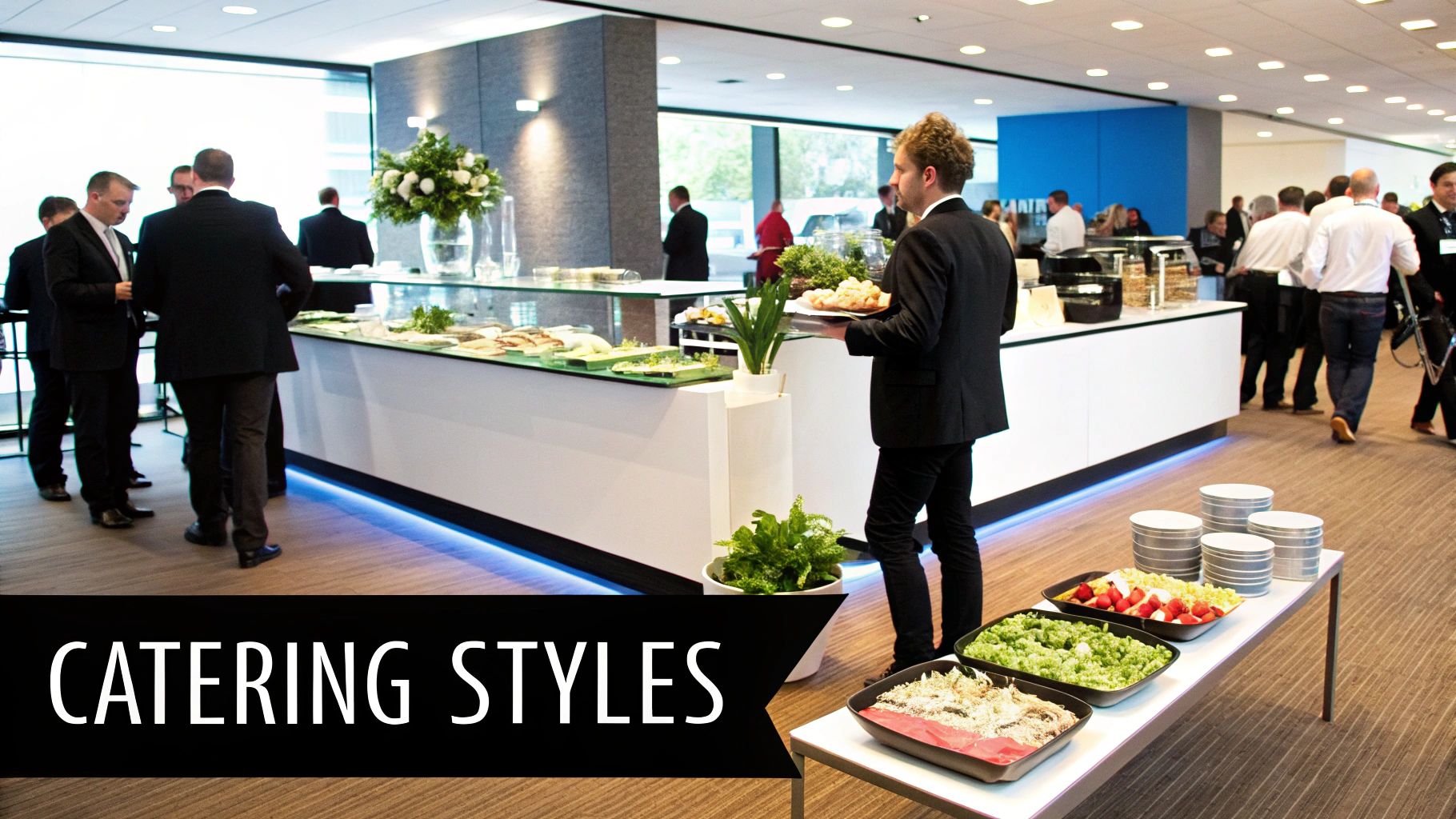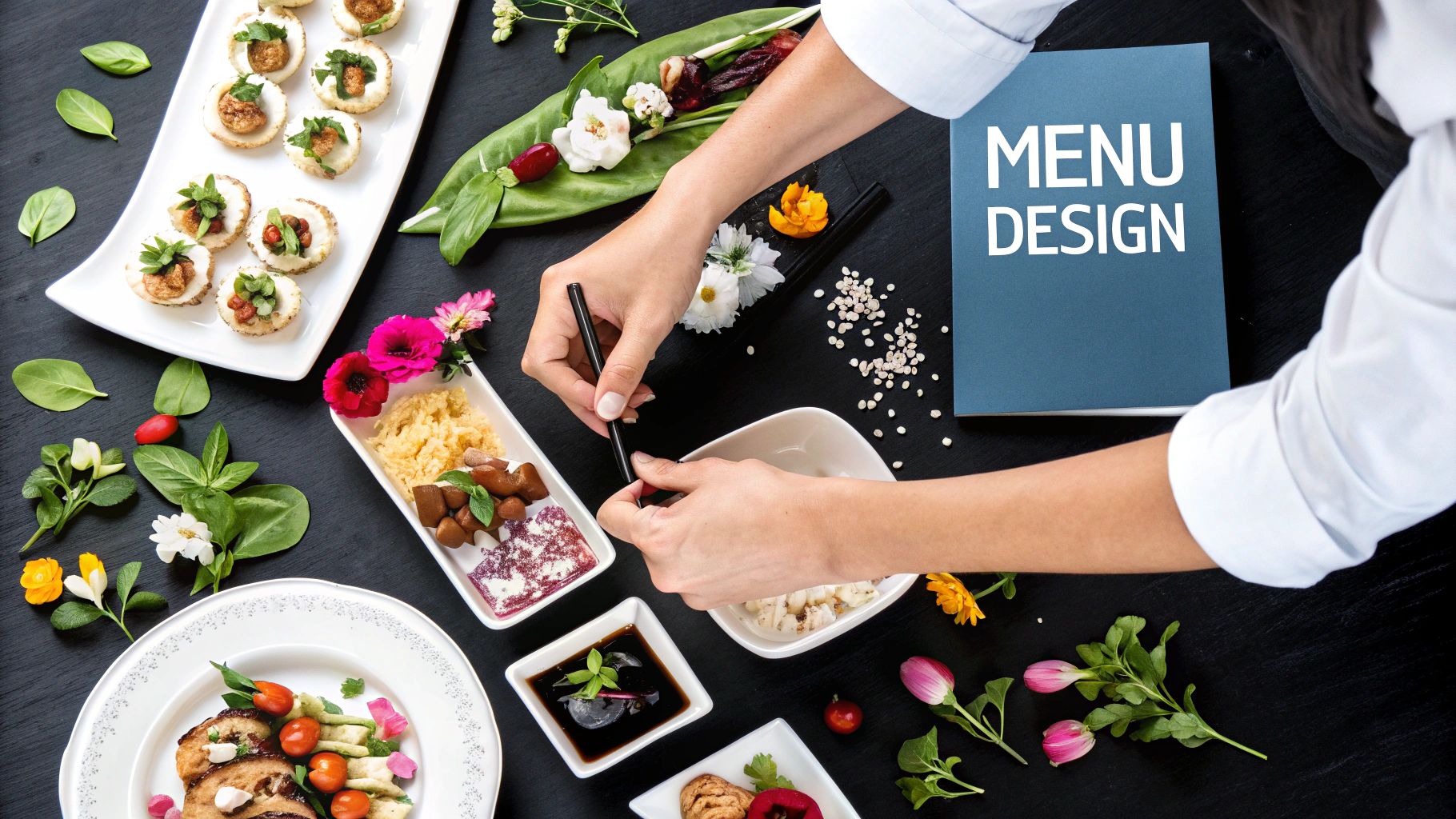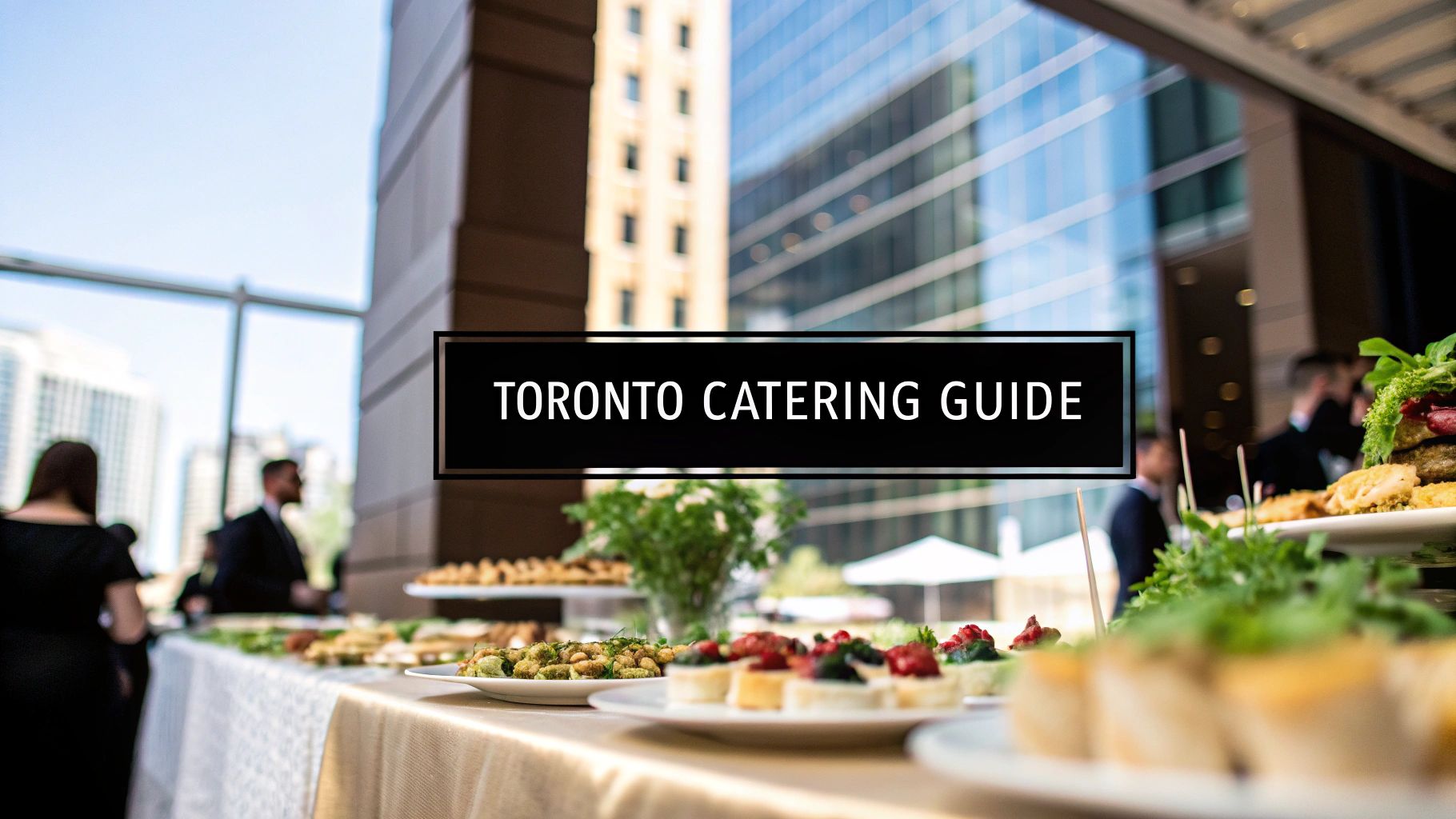Picking the right catering company in Toronto can feel like a huge task. You're not just looking for someone to drop off food; you're searching for a partner who gets the vibe of your event, understands your company culture, and can impress your guests. It’s a big decision that can make or break your corporate function.
Finding the Right Caterer in Toronto’s Food Scene
Think of your caterer less as a vendor and more as a crucial part of your event-planning team. In a city like Toronto, famous for its incredible food scene, the sheer number of options can be overwhelming. How do you sort through them all to find a real gem? This guide will walk you through it.
We're going to dig deeper than just picking a menu. We'll cover everything from matching the service style to your event's atmosphere, creating a menu that works for everyone, and getting a handle on the budget. The goal is to give you the confidence to find a partner who will make your next corporate event one to remember.
Core Pillars of Catering Selection
To simplify your decision, I always recommend breaking it down into three key areas. Get these right, and you're well on your way to a successful event.
This infographic breaks down what I consider the three pillars of choosing a caterer: Service Styles, Menu Creation, and Budget Planning.

As you can see, they’re all connected. You can't change one without affecting the others, so finding the right balance is everything.
Understanding the Local Market
The catering scene in Canada, and especially here in Toronto, has been through some interesting changes. The industry's revenue actually dropped by 6.7% annually over the last five years, landing at about CAD $3.1 billion. What’s really telling is that no single company owns more than 5% of the market. This means the landscape is packed with small and medium-sized local businesses, all competing for your attention. You can discover more insights about the Canadian catering industry if you want to dig into the data.
This fierce competition is actually great news for you. It pushes caterers to be more creative, keep their pricing sharp, and offer specialized services—from farm-to-table menus to unique culinary setups designed specifically for the corporate world.
What this means for your search is that you have a ton of choice, from hyper-specialized niche caterers to larger, full-service operations. It also means that doing your homework is more important than ever to find that perfect fit for your company’s needs.
Matching Catering Styles to Your Event's Goal
The food you choose for a corporate event is a big deal, but how you serve it can make or break the entire experience. The service style is what sets the tone for the room. It guides the flow of the event and can either encourage people to mingle or keep them glued to their seats.
Think of it like choosing the right music for a party. The right style complements the main event, while the wrong one can feel jarring and out of place. When you start talking to a catering company in Toronto, they’ll walk you through a few core options. Understanding what each one does best is the key to creating an event that feels seamless and perfectly matches what you’re trying to achieve.

Efficient and Focused: Boxed Lunches
Boxed lunches are your secret weapon for productivity. When you have a jam-packed agenda for a training seminar, a working lunch, or a conference on a tight schedule, this is the way to go. Every guest gets their own neat, self-contained meal, which means no lines and no wasted time.
This approach keeps disruptions to a minimum and lets people eat when they’re ready, whether it’s at their seat or during a quick breakout. It’s a practical, no-fuss solution that puts the focus squarely on the day’s content, not on a long, drawn-out meal.
Encouraging Mingling: Buffets and Stations
If you want people to connect and network, a buffet is a classic for a reason. It naturally gets everyone up and moving around the room. This setup is perfect for sparking those impromptu conversations as people chat in line or gather around the food. A great buffet also makes it easy to offer a ton of variety, so pleasing different tastes and dietary needs is a breeze.
Want to kick it up a notch? Go with interactive food stations. These are like mini, themed buffets—think a build-your-own taco bar or a chef tossing fresh pasta. Stations prevent bottlenecks, create multiple conversation hubs, and give guests a fun, shared activity. This is an absolute winner for a company holiday party or a product launch where you want a buzzing, social vibe.
A study on event engagement found that interactive elements can increase attendee satisfaction by over 30%. Food stations turn a meal into an experience, making your event more memorable and giving guests something to talk about.
Fostering Collaboration: Family-Style Service
Family-style dining hits that sweet spot right between a formal plated dinner and a casual buffet. Big, beautiful platters of food are brought to the centre of each table, and guests help themselves and pass the dishes around. The simple act of passing a platter builds an instant sense of camaraderie and gets conversations flowing.
This style is tailor-made for team-building lunches or any gathering where the goal is to strengthen relationships. It creates a warm, communal atmosphere that feels genuinely collaborative. It’s the perfect choice for a dinner celebrating a team that just wrapped up a huge project, reflecting their shared effort and success.
Elevating Formality: Plated Dinners
For your most formal and high-stakes corporate events, nothing beats a full-service plated dinner. This is the gold standard for awards galas, executive board dinners, and keynote speaker events where you need everyone’s undivided attention on the main stage.
Each guest is served an elegant, multi-course meal right at their seat, creating a sophisticated experience that feels effortless for them. This format gives you precise control over timing, which is crucial when you’re coordinating with speeches and presentations. While it’s typically the most expensive option because of the staff required, a plated dinner sends a clear message of importance and appreciation for your guests.
To help you decide, here’s a quick breakdown of how these popular service styles stack up against each other for a typical Toronto corporate event.
Comparing Catering Service Styles for Your Toronto Event
This table provides a side-by-side comparison of common corporate catering formats, helping you choose the best fit for your event's style, budget, and logistical needs.
| Service Style | Best For | Pros | Cons |
|---|---|---|---|
| Boxed Lunch | Working lunches, training seminars, conferences with tight schedules. | • Highly efficient, no lines • Easy to manage • Cost-effective |
• Least social option • Limited food choice per box • Can feel less special |
| Buffet Style | Networking events, casual parties, events with diverse dietary needs. | • Encourages mingling • Wide variety of options • Guests control portions |
• Can create long queues • Can lead to food waste • Less formal atmosphere |
| Food Stations | Social mixers, holiday parties, large-scale networking events. | • Very interactive and engaging • Breaks up crowds • Creates a memorable experience |
• Requires more space • Can be more expensive • Guests are constantly moving |
| Family Style | Team-building events, collaborative meetings, celebratory dinners. | • Fosters conversation • Feels communal and warm • More relaxed than plated |
• Portioning can be uneven • Requires large tables • May be messy for some dishes |
| Plated Dinner | Formal galas, awards nights, executive dinners, keynote events. | • Elegant and sophisticated • Precise control over timing • All guests served at once |
• Most expensive option • Limited menu choice • Requires significant staff |
Ultimately, the best choice depends entirely on your event's specific goals. By thinking through the atmosphere you want to create, you can select a service style that not only feeds your guests but also enhances their entire experience.
Designing a Menu That Wows Your Guests
Think of your event's menu as more than just fuel—it's the heart of the experience. It's what gets people talking and what they'll remember long after the meeting wraps up. Getting the food right in a city as diverse as Toronto shows you’ve put real thought into your event, and that reflects incredibly well on your brand.
A well-crafted menu doesn't just fill stomachs; it breaks the ice, complements your event's theme, and makes every guest feel personally looked after. When you team up with a great catering company in Toronto, planning the menu becomes less of a chore and more of a creative partnership.

Prioritizing Dietary Inclusivity
In a city like Toronto, you can bet your guest list will include a mix of dietary needs. Vegan, gluten-free, halal—these aren't edge cases anymore, they're standard. Making these options a core part of your menu from the get-go is a simple way to show everyone they're welcome.
It’s far better to plan for these needs from the start than to scramble for a last-minute solution. A good caterer won't just offer a sad-looking salad as the "vegan option"; they'll create dishes that are just as flavourful and appealing as everything else on the menu. This ensures everyone has a fantastic dining experience.
In Toronto, people expect high-quality, inclusive food choices. This shift has pushed the catering industry to get serious about dietary accommodations, making gluten-free and vegan meals a staple at corporate events. This mirrors broader trends in the restaurant world, where consumer demand is king.
The Impact of Local and Seasonal Ingredients
There’s a real, tangible benefit to choosing a caterer that sources their ingredients locally. For starters, the food just tastes better. Ingredients picked at their peak and brought straight from an Ontario farm to your event have a freshness and flavour you can't fake.
Beyond taste, it’s a smart move for your brand. Supporting local producers and championing sustainability can tie directly into your company's values. It tells a story of quality and community-mindedness. When you're vetting caterers, don't be shy—ask them about their relationships with local farms and suppliers.
Balancing Familiar Favourites with Unique Flavours
The secret to a crowd-pleasing menu is finding that sweet spot between comfort food and culinary adventure. You need those reliable favourites that you know everyone will love, but you also want a few unique dishes that will spark curiosity and conversation.
For instance, you could serve a fantastic grilled chicken alongside something a little more adventurous like lamb kofta or a vibrant, plant-based curry. This way, you cater to both the picky eaters and the foodies in the room. You can see a great example of this by checking out the Shawarma Moose catering menu, which blends traditional Mediterranean hits with modern twists.
Here's a simple way to strike that balance:
- Follow the 70/30 Rule: Make 70% of your menu classic, beloved dishes. Use the remaining 30% to introduce unique, international, or trendy flavours that capture Toronto's foodie spirit.
- Try Themed Stations: If your event format allows, set up different stations. One could be a classic slider bar, while another could be a build-your-own poké bowl station. This gives guests control and variety.
- Label Everything Clearly: Don't just list allergens. Add short, helpful descriptions like "Spicy," "Mild," or "Herbal." This helps guests confidently choose dishes they know they'll enjoy.
Breaking Down Your Corporate Catering Budget
Figuring out a catering quote can sometimes feel like trying to solve a puzzle. You see that price per person for the food, but that's almost never the final number you'll pay. A detailed quote from a professional catering company in Toronto will have several line items, and knowing what they are ahead of time is the key to avoiding any last-minute budget shocks.
Think of it like this: the food is the foundation of your event. It's the most important part, of course. But you still need the walls, the roof, and the wiring to make a house a home. In catering, those "extras" are the staff, equipment, and logistical details that pull the entire experience together.
A transparent quote is one of the biggest signs of a trustworthy caterer. It means they’re being upfront about every cost and want you to understand exactly where your money is going. Let’s pull back the curtain on the common costs you should expect to see.
Beyond the Per-Person Food Cost
That price per head for your menu? It's just the starting line. Several other factors play a huge role in the final invoice, and each one is crucial for making sure your event runs smoothly. Being aware of these helps you build a realistic, all-encompassing budget from day one.
Here are the key costs to keep in mind:
- Staffing Fees: This covers your entire service team—the chefs, servers, bartenders, and the crew that sets everything up. The final cost here is tied directly to your service style. A formal, plated dinner needs a lot more server attention than a drop-off buffet, and that will be reflected in this line item.
- Equipment Rentals: Unless your venue has a fully stocked kitchen and dining room, you'll likely need to rent things like tables, chairs, linens, glassware, and serving dishes. A good caterer handles all these logistics for you, but the cost will be itemized on your quote.
- Delivery and Travel Charges: This fee covers getting the food, equipment, and staff to your venue and back. It can change based on how far they have to travel and how complex the setup is.
- Service Gratuities and Administrative Fees: Most caterers add a service charge, typically around 15-20%, which covers the back-end operational costs of planning and managing your event. This isn't the same as a tip for the staff, which might be optional or included separately.
When you understand these different parts of the quote, you can work with your caterer to find ways to fit your budget. For example, choosing high-quality disposable plates instead of real china can make a big dent in both rental fees and the staffing costs needed for cleanup.
Smart Budgeting Strategies
Setting a realistic budget isn’t about finding the absolute cheapest option. It’s about being smart with your funds to create the best possible experience for your guests. A great place to start is to figure out your total budget, then divide it by your number of guests. This gives you a rough per-person figure you can take to a catering company in Toronto as a clear target.
You can then explore different corporate catering packages in Toronto that are built for various price points and service styles, making it much easier to find something that works for you.
Here are a few insider tips for managing your budget without compromising on quality:
- Choose a Buffet Over a Plated Dinner: Buffets are fantastic because they require fewer servers, which can seriously lower your staffing costs while still giving your guests a ton of variety.
- Be Strategic with Your Menu: Stick with high-quality, seasonal ingredients. Well-prepared chicken or pasta dishes are often much more budget-friendly than steak or seafood and can be just as impressive.
- Limit Bar Options: Instead of a full, top-shelf open bar, why not offer a thoughtful selection of beer, wine, and one signature cocktail? It’s a simple way to control costs while still feeling generous and fun.
How to Vet and Choose Your Catering Partner

Choosing the right caterer isn't just about picking food off a menu. It’s about finding a reliable partner who can execute your vision flawlessly. Think of it like hiring a key member of your event team—you need someone with the right experience, a solid reputation, and the ability to stay cool under pressure.
When you find that perfect fit, you're not just making a transaction. You're building a relationship. A great catering company in Toronto becomes an extension of your own team, just as dedicated as you are to making your event a hit.
Start with Some Smart Research
Your first move is a bit of digital detective work. A caterer’s online presence is their professional portfolio, and it tells you a lot. Scour their website. Do the photos of past corporate events reflect the standard of quality and presentation you expect for your own company?
Then, hit up their social media and third-party review sites like Google and Yelp. You're looking for patterns in the feedback. Consistent praise for punctuality, staff professionalism, and amazing flavour? Those are green flags. This initial research helps you narrow the field to a shortlist of contenders who look like they can deliver.
Ask the Right Questions
With your shortlist in hand, it's time to make contact. A quick phone call or email is your chance to dig deeper and get the details that matter. Don't hold back—the answers you get will speak volumes about their professionalism and whether they're right for your event.
Before you reach out, jot down a list of questions. This keeps you focused and makes it easy to compare what different companies have to offer.
Here are the essentials you absolutely need to ask:
- Corporate Event Experience: Have them walk you through their experience with corporate events similar to yours in size and style. A caterer who mainly does weddings might not be equipped for the pace of a business luncheon.
- Licensing and Insurance: This one’s non-negotiable. Confirm they have a valid business license, food handler certifications, and liability insurance. It’s a crucial step that protects your company.
- Contingency Planning: What happens when things go sideways? Ask about their backup plans for last-minute guest additions, equipment failures, or staff calling in sick. A pro will have answers ready.
- Sourcing and Ingredients: Find out where they get their ingredients. Caterers who prioritize local, seasonal produce often deliver a much fresher, higher-quality product.
These questions help you get a clear picture of their operational strength and commitment to quality, so there are no unwelcome surprises on event day.
The Canadian catering services market is booming, projected to grow from around USD 3.94 billion to USD 6.05 billion by 2033. For Toronto businesses, this is great news. It means you have a huge pool of specialized, top-tier caterers to choose from.
The All-Important Tasting Session
Never, ever skip the tasting. It's probably the single most critical step in this whole process. A tasting gives you concrete proof of a caterer’s culinary chops, presentation flair, and service quality. It’s where the promises on their website meet reality.
This is your chance to sample the exact dishes you’re thinking about serving. Pay close attention to flavour, of course, but also to the plating, portion sizes, and the overall look. It’s also a perfect time to interact with their staff and see how professional and attentive they are.
A caterer who’s proud of their food will be enthusiastic about setting up a tasting. If they seem hesitant or want to charge a fortune for it, consider that a potential red flag. Think of the tasting as the final interview. It's where you confirm that they can truly walk the walk.
After this, you'll have everything you need to pick your partner with total confidence. To get a better idea of what makes a catering service truly stand out, you might want to check out the top reasons why Shawarma Moose is a go-to choice in Toronto.
Final Questions to Ask Your Toronto Caterer
As you get closer to locking in a caterer for your Toronto event, a few final questions always seem to pop up. Getting these details sorted out ahead of time is the key to making sure everything runs smoothly and there are no last-minute surprises.
Think of this as your final due diligence. Running through these points with a potential caterer helps you know for sure that you've found a solid partner who can really bring your event to life.
How Far in Advance Should I Book?
For any big corporate event—I’m talking 50 guests or more—you'll want to book your caterer 3-6 months out. This is a big deal, especially if your event falls during Toronto's peak seasons like summer or the winter holidays. The best ones get snapped up fast.
If you're just planning a small office lunch or a casual team meeting, 1-2 weeks' notice is usually plenty of time. Booking early doesn't just guarantee you get your first choice; it gives your catering company in Toronto the breathing room they need to plan your menu perfectly and nail down all the logistics.
What's the Best Way to Handle Dietary Needs?
The easiest and most effective way to manage this is to ask about dietary restrictions and allergies when your guests RSVP. It’s a simple step that saves a world of headaches later on.
Once you have that info, put together a clear, organised list for your caterer. Be specific: "five vegan, three gluten-free, one severe nut allergy."
A great caterer won't just see this as a problem to solve. They'll create alternative dishes that are just as delicious as the main menu. They should also be committed to labelling everything clearly at the event to avoid any mix-ups and keep your guests safe and happy.
What Absolutely Must Be in the Catering Contract?
The contract is your safety net. It protects you and the caterer, so it needs to be crystal clear and leave no room for misunderstandings. Don't sign anything until you've checked for these key details.
Make sure the agreement spells out:
- The exact date, time, and location of your event.
- A line-by-line list of every single menu item.
- A full cost breakdown, including food, staff, rentals, taxes, and any service fees.
- The final deadline for giving them your guest count.
- A clear payment schedule with all the due dates.
- Their official cancellation policy—what happens if plans change?
Getting everything you discussed in writing is the final, crucial step to locking in a partner for a stress-free and successful event.
Ready to make your next corporate event unforgettable? At Shawarma Moose, we offer reliable, flavourful, and stress-free catering solutions for businesses across Toronto. Explore our customizable menu options at shawarmamoose.ca/catering.

